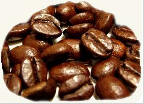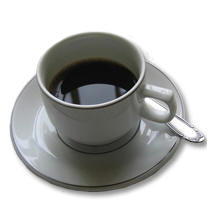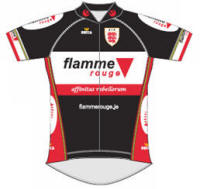Suplement ~ Caffeine
 In
January 2004 Caffeine was removed from the WADA (World Anti-Doping
Agency) Prohibited Substance List. This move is significant for many reasons
but mainly because it allows athletes, whose sport is compliant with
the WADA code, to consume caffeine as part of their normal diet, or for
enhancing sporting performance, without fear of returning a positive test
result.
In
January 2004 Caffeine was removed from the WADA (World Anti-Doping
Agency) Prohibited Substance List. This move is significant for many reasons
but mainly because it allows athletes, whose sport is compliant with
the WADA code, to consume caffeine as part of their normal diet, or for
enhancing sporting performance, without fear of returning a positive test
result.
The sport of cycling has signed up to that code through the UCI, and Jersey has signed up to that code through their Commonwealth Games Association. To see a full list of the sports, associations and governing bodies signed up the code, click here. One significant sporting body missing from the list is FIFA. Draw your own conclusions!
What is it?
Caffeine is a readily available, cheap, naturally occurring
substance found in many leaves, plants and seeds. Caffeine is one of
the worlds most readily acceptable drugs. It's classed as a drug
because it has a pharmacological effect on the body.
It can be found in tea, coffee, chocolate, cola based drinks, energy drinks, confectionery, diet supplements, sports supplements, ergogenic aids, the list goes on. And if you see any sweets with guarana in it, like Cadbury's Boost bars, that's caffeine that is.
 Tons
of research has been carried out on caffeine over the past 20 years
and to be honest some of it is contradictory, some of it is
inconclusive and some of it highlights specific attributes, depending
on who paid for the research in the first place.
Tons
of research has been carried out on caffeine over the past 20 years
and to be honest some of it is contradictory, some of it is
inconclusive and some of it highlights specific attributes, depending
on who paid for the research in the first place.
Almost all of the research says it may have an effect under certain circumstances and certain conditions and may affect certain individuals more than others.
There are positive and negative effects and you may be more adversely affected than positively. As with all these things, there are always a lot of "mays" around. So, you pay your money and take your choice.
What does it do?
Caffeine "has been shown to:
▼ mobilise fats from adipose tissue & muscle cells
▼ affect changes to muscle contractility
▼ change perceptions of effort required
▼ change levels of fatigue endured
▼ stimulate release of adrenaline
▼ affect the workings of cardiac muscles
What is known is that caffeine allows the release of free fatty acids into the bloodstream. As you all know, aerobic exercise derives its main energy sources from "fat-burning".
So the more fat that's available to burn the more glycogen will be spared. The longer glycogen levels can be maintained, the longer you can exercise before fatigue sets in.
The peak plasma level of caffeine occurs approximately 60 minutes after consumption. Researchers have noted up to a 100 percent increase in plasma free fatty acids after only 60 minutes, and allowing 60 minutes for digestion is common among research groups. So, regarding when to take it? Shall I make a recommendation or will you work it out for yourself?
Caffeine is known to improve muscular function through the facilitation of muscle contraction. Therefore, a smaller stimulus can cause a greater twitch tension which allows muscles to contract with less effort. The less effort used to power the muscles the more effort is available to use as power. Effectiveness now becomes more efficient.
How does it do it?
To be honest not a lot is published
in layman's terms about how caffeine does what it does. Most
sporting studies measure the performance gains and attributes of a
substance, they don't study how it does it. To understand how this
is, I'll give you an example I don't want you to follow!
If you went out and drunk 10 pints of lager you could quite easily, without any scientific training, recognise the effects of your experiment. You might not know why or how your balance became affected, you would just know that it had!Again, although it's not known how, tested athletes consistently report a lower level of exertion for a given output of effort. Or, for the same level of exertion they maintain a higher level of output.
How can it help me?
Caffeine may help you as an athlete by speeding body and brain cell activity
to a point where the body enters a state of alertness. This increase in activity sets
off a chain reaction whereby the pituitary gland reacts by releasing
hormones that cause the adrenal gland to produce adrenaline.
As a result, bronchial tubes dilate to increase breathing, heart rate increases, blood pressure rises, sugar is released into the blood stream, and your body generally prepares for action. Great if you want to excel at a power, endurance or aggression based sport. Pretty crap if you play snooker or chess.
Caffeine can also be used to help "burn fat" during those new year endurance rides, when we all need to trim ourselves down a little.
 What is the dosage required?
What is the dosage required?
Many reports, studies and books use coffee as the dosage guide.
For instance, take two cups of coffee an hour before your event and watch yourself fly.
Well, it ain't that simple. I don't like coffee, which is why, if you come to my house you'll probably get a cup of Mellow Birds. Which won't contain the same level of caffeine as your average French hotel rocket fuel.
Anyway, some of the other compounds found in coffee negate the effect of the caffeine itself. So coffee isn't always the answer.
The way to reliably take caffeine is in pill form. That way you know exactly what you're getting. Only moderate levels of caffeine are required to provide beneficial results; and no evidence has ever been produced to suggest that increased dosage leads to increased benefit.
A dosage as little as 1 to 3 mg per kilogram of body weight will provide beneficial effects.
If you do undertake caffeine supplementation start at 1mg/kg and pay attention to any side effects and performance gains. If it works, stay at that level. As I said earlier more isn't better.
Dosages of greater than 6mg/kg cause negative performance gains and dosages greater than 9mg/kg may prove toxic.
Everyone is different and everyone will react differently to the same stimulus. Always. always, always use the minimum amount of any supplement to gain a desired effect. Always apply the 80~20 rule.
What has what in it?
| Caffeine Content (mg) | ||
| ▼ Instant Coffee | 250 ml | 12 - 169 |
| ▼ Brewed Coffee | 250 ml | 40 - 100 |
| ▼ Tea | 250 ml | 9 - 51 |
| ▼Hot Chocolate Drink | 250 ml | 5 - 10 |
| ▼ Milk Chocolate | 60 g | 5 - 15 |
| ▼ Dark Chocolate | 60 g | 10 - 50 |
| ▼ Coca Cola | 375 ml | 49 |
| ▼ Pepsi Cola | 35 ml | 40 |
| ▼ V ~ Energy Drink | 375 ml | 50 |
| ▼ Red Bull | 250 ml | 80 |
| ▼ Power Bar Caff-Gel | 40g | 25 |
What should I be aware of?
 Caffeine
in many ways is a wolf in sheep's clothing.
Caffeine
in many ways is a wolf in sheep's clothing.
Because we see, drink and use it everyday we become unaware or blasé of its down sides.
Caffeine is a stimulant, and like most stimulants, it's addictive and becomes less effective with time.
Figuratively speaking, the dose that gives you a lift today will not have the same effect tomorrow. That will take two doses, then next week three, then next month four.
Higher doses of caffeine cause nausea, stomach cramps, anxiety and can give you "gastric distress". So be careful.
Also, the often quoted side-effect of caffeine being a diuretic is not supported by athletic research. Obviously proper athletes, like ourselves, have hydration strategies that ensure adequate fluids are taken at all times. If you have a mug of coffee, you've taken on half a pint of water with your caffeine. If you pop a pill, make sure you drink enough fluids to support it.
Caffeine and the compounds found in coffee and cola drinks can prevent the absorption of many other vital minerals and vitamins the body needs. Especially the bodies of athletes.
Calcium, iron, thiamine and others are known to be affected. And remember, that can of coke that gives you a caffeine lift also has god-knows-how many spoons of sugar in it.
As for diet stuff, that contains aspartame. Don't get me started on that, it's a whole warning subject in itself.
Caffeine can cause the heart to race and increase the onset of palpitations. It can also seriously affect the sympathetic and central nervous system, causing headaches and other reactions, like the shakes.
Also, if you take coffee to give you your sporting boost, don't put milk and sugar in it. Milk isn't good for you before a race and you don't want an insulin rise to compensate for your sugar spike.
Never, ever, try caffeine or any other supplement without seeking medical advice and doing your own research. And never try it out the morning of your key objective.
Winter training is the best time to "experiment" then maybe for the odd early season races. And remember, the more you use it the less effective it becomes. So don't try it for every race!
The Message
Caffeine can help you in endurance events lasting 60 minutes or longer.
Take it an hour before the event at around 2mg/kg body weight and make
sure you've done a dry run in a non-important event beforehand.
If you drink loads of coffee then you are less likely to benefit from caffeine supplementation. If you don't drink loads of coffee you are more likely to suffer from the adverse effects of caffeine supplementation.
As a final note, did you notice that the pro's were openly drinking cans of coke during this years Tour? Once the stage got past half way the cans of coke came out. But you should also notice that they get water bottles passed to them every ten minutes and can stop for a "comfort break" during the race then get back on! Don't think you can put it in your bottle and take it at the turn of a ten mile time trial.
Take Note:
 This article is neither an endorsement or a condemnation of the subject
of this article or any other supplement use. It is here to allow
the reader to draw their own informed conclusion.
This article is neither an endorsement or a condemnation of the subject
of this article or any other supplement use. It is here to allow
the reader to draw their own informed conclusion.
Do your research and if any doubt consult a physician before undertaking any supplement regimen. Never take more than the stated dose and never mix any drug or supplement with alcohol. Always check that you are not contravening any sporting code, ethics or permitted levels for your sport before undertaking any supplementation.
Where can I get some?
Big Maggy's ~ Big Magnus Backstedt's
special mix







